- Home
- Chelsea Handler
Life Will Be the Death of Me Page 2
Life Will Be the Death of Me Read online
Page 2
Through the months of thick fog and despair after the election, he was the one bright spot. He also represented a seminal moment for me personally; I had finally found the first Republican I could see myself being penetrated by. #MuellerTime.
* * *
• • •
Back to my midlife crisis. There is a line I had written down from Viktor Frankl’s memoir about surviving the Holocaust, Man’s Search for Meaning, that stopped me cold when I read it: “it did not really matter what we expected from life, but rather what life expected from us.” I had never thought about what life expected from me. I had only thought about what I expected from life. That was a book putter-downer. It was a look up at the sky and wonder Where the fuck have I been all my life? moment.
My dad used to tell me that there was always one line in every book that summed up the entire book. He also said that even if you don’t understand everything you’re reading in an article or a book, or even hearing in a conversation, try to take one piece of information away from it—that way you’ve left with something new to add to your brain. At the time, I was only eight, but I was already sick and tired of my father forcing me to read so many hard books—The Fountainhead, East of Eden, Anna Karenina—that I would always look for the first line that I thought would give him the impression that I had read the books he assigned. This was that line from Viktor Frankl. What does life expect out of me?
How lost was I if that question had never occurred to me—and it hadn’t. I had to read it to think it. What a fucking dummy I was, rewarding myself over and over again with homes and cars and vacations and gross extravagance. I justified all of it because I worked for everything I had. I came from nothing, I told myself. For years, that was my story. Work hard, fight hard, don’t give up. You can do anything. You deserve this.
The idea that I came from nothing is a joke. My parents were disappointing in many respects, but I always felt loved—by a lot of people. I never went hungry. I never struggled. I was white, pretty, and Jewish, and had a ton of misplaced self-confidence, so life got easier the more focused I became. I got to Hollywood and was rewarded for all of the above. It took a few years, but I never thought it wasn’t going to happen, and people who like me can say it’s because of talent, but talent is a nonissue. There are too many untalented people who are successful, and too many talented people who aren’t. Talent is neither here nor there. Becoming famous just seemed like the easiest way to become wealthy without going to college. That was my mindset. It was a lot of luck and a lot of privilege.
My life was a bubble. That’s exactly what it had become. A big vapid bubble. What were my ties to being famous? To being a celebrity? Wealth and fame existed as a couple in my mind; they went together. Did that mean I could still have one without the other—and, if so, which one would I choose? Was this my whole life? No. It can’t be.
Do I get to fall in love again? With a man? No, a man can’t help me with this. You got yourself here. So, the question is: What am I going to do with myself now? What is my enough?
I’ve always been generous, but that’s always come easily to me. It’s easy to give. If anything, it feeds my ego to give to others. Real generosity is also showing up when you don’t feel like it—sacrificing your own happiness in exchange for someone else’s. Was I willing to do that? What am I willing to do that I really don’t want to do? Is that something I’m even capable of?
I never had to care about the state of the world before. The world was a vague thought and a whimsical fancy—that was for the adults. I thought that by traveling to so many different countries, I was doing my due diligence, that by edifying myself with other cultures, and sharing my experiences on camera and on my show, I was somehow making a worthy contribution to society. America wasn’t a problem. There was no problem. We had elected a black president. Racism and feminism were fights we had already won. America was being handled by people smarter and more skilled in politics, and they took care of this stuff so that people like me could live the American dream and remain blissfully ill-informed. I had spent my adulthood on a cigarette boat going a hundred miles per hour, and now I felt like I had somehow become marooned on one of those terrible all-inclusive Carnival cruise ships.
* * *
• • •
Tanner fixed my TV and awkwardly put the iPad on my lap. I wondered if Tanner was the awkward one or maybe I was just stoned too much of the time and I was the awkward one. And if that was right, why was I stoned all the time? Then I remembered that I was coming out with my own line of weed and the reason I was stoned all the time was because I was doing research. That’s a true story. I also have the Trump family to thank for my newfound love of vaping and edibles. I had to get stoned to watch the news because alcohol and outrage don’t mix well—a hat on a hat.
Time speeds up as it goes by. Someone explained to me that there is a mathematical reason for this: as you age, each year becomes a smaller percentage of the life you have already lived. I’m forty-two as I write this. One year now represents a small percentage of my forty-two years (about 2.38 percent). But when I was eight, one year was a really long time; it was an eighth of my life. (This is why summer lasted about four years when you were a kid.) This may be why I now feel an urgency to know more, to do more, to be more.
Don’t get me wrong—I don’t believe life is too short. I believe life is too long. It’s exhausting. I don’t fear dying. I want people to know that: if I die early, it’s not some “tragedy”; I’d be relieved. My life has been an incredible adventure. I have $250,000 set aside for my funeral because I want everyone to have one big fucking party in my honor. I want to have a great funeral filled with dancing, little people, mushrooms—little people on mushrooms. I want it to be a celebration for all the people who love me and for all the people who are happy to see me go. (Note to self: You should probably put that money toward something more meaningful than a party for yourself—like maybe Syrian refugees or the NAACP. Just a thought.)
However, in the meantime—between now and then—this is my attempt at taking stock of how I got here, where I have been, and where it is I’m going. What exactly it is that I might bring to the table to answer the question that Viktor Frankl forced me to ask myself. Do I have the conviction to examine myself unflinchingly, to reveal the good and the bad, the ugly and the beautiful? The answer is yes. I have a lot to be embarrassed about, and I intend to advertise it.
I’m sick of my voice, of my ambition, of my entitlement. I’m sick of not knowing more, and I’m embarrassed it took me this long to recognize it. Life has been too easy. I’ve gotten almost everything I’ve ever wanted and I’m forty-two. Something smells funny.
And after all is said and done, I’d like to be cremated and have my ashes scattered over Bob Mueller’s grave. Or inside it. Or his inside mine…or me. Or in one of Daniel Day-Lewis’s clogs.
Thank you.
There was a time in my life when astrology and psychics—not to be confused with physics—fascinated me, but as a general rule, I think it’s all a bunch of bullshit. Meditation seems to work for some people, while medication works for others, which explains why it’s very difficult for me to sit still with my eyes closed for any length of time without Rohypnol.
I’m all for people being “spiritual,” but I am leery of anyone who mentions it more than once in a single sitting, unless, of course, one is on a spiritual retreat—which I hope to God I will never be, if there even is a God. Jury’s out on that one too, at least until the Rapture—an event I’m convinced will end up taking place at the Hollywood Bowl.
I believe in spirituality as a component of your lifestyle; the problem is that “spiritual people” can sometimes be giant assholes. Madonna doesn’t make me want to practice Kabbalah; she makes me wonder what on earth she has on them that they are willing to let her be their most famous brand ambassador. At least Tom Cruise is a good front man for Scientology,
because he seems nice, even though he’s obviously out of his fucking tree.
I feel spiritual when I’m on mushrooms. I’m not into rocks and crystals and chakras and healers…I just think everyone is looking for something, and it seems like some people will settle on the first ray of sun or glimmer of hope they bump into. Los Angeles is a tricky place for vulnerable people. Hourly, you hear words like “gratitude,” “universe,” and “manifest,” and terms like “micro–panic attack” and “artisanal deodorant.” It is a place consumed with trends and fads and avocados and kale, but everything has a shelf life. There will be a point when the women and gay population of Los Angeles will turn their backs on avocados and kale—claiming they cause both cancer and erectile dysfunction—only to turn their attention toward some new colonic hydrotherapist/mystic who convinces everyone that a steady diet of fried calamari is the new anti-inflammatory food for the ages. It will quickly appear on the menu of upscale restaurants and there will be stores selling pre-packaged fresh calamari for eleven dollars a serving. It’s hard to take anything or anyone seriously after a while.
* * *
• • •
I needed to talk to someone but I was embarrassed that I needed to talk to someone. I had spent years skirting the issue of therapy based on the fact that my life was working out pretty well, minus an emotionally stable relationship with someone of the opposite sex. To anyone who would query, I would say, “I’m better off single. I don’t want to be tethered to anyone. I’m not a relationship girl.” My most recent favorite line was, “I’m just more high-functioning as a single person.”
After all, if ninety percent of people were in relationships, then clearly I was special if I had managed to avoid one.
I was forty-two when I finally saw a real psychiatrist. I had seen doctors and therapists before, but never really with the intention of fixing anything that ran deep. I didn’t have the mental equipment to articulate my pain and let someone see me for anything other than what I had become—strong. I was strong, and because of that strength, I wasn’t about to sit in a doctor’s office and cry. Crying for other people was fine. Crying for myself about myself was out of the question. Vulnerability in my mind was akin to carbohydrates: I wasn’t willing to go there unless it was alcohol-induced.
What I didn’t yet know was that when I was crying for other people, I was absolutely crying for myself.
And another thing: therapy always seemed too narcissistic—like navel-gazing. My whole entire life was about me; I’ve had eponymously named TV shows for the past twelve years, and a whole team of people who worked for me; and it seemed gross to sit around and spend more time talking about myself, never mind the fact that I was sick and tired of hearing the sound of my own voice. I felt like I should switch from talking to writing. Or at the very least tweeting. I just wanted to write or tweet everything, including my TV show. I looked at therapy as a horrible option; it would require listening to myself speak, rather than just speaking and having someone else edit it.
I didn’t know how to ask for help—from anyone. I was surviving. My brother died when I was nine, my mother when I was thirty-one, after years of fighting cancer. My brother’s death made us stronger as a family. I thought these tragedies were the reason for my tenacity. If anyone needed a strong friend, I was the one they could lean on. Give me someone else’s crisis and I could fix it. I could handle anything. I was tough. It never occurred to me to wonder why I had heard so many times that people were scared of me.
“Who would ever want to be that tough?” is what one MFCC (marriage, family, and child counselor) said to me, when I’d said all of the above to him. I wasn’t interested in rehashing my past—only in improving my present-day self. I said, “I just need to get better at being me.”
Every therapist I saw before I reached the age of forty-two made me feel like I was running in place. I would go for a period of time and then I would eventually get bored. Often, I knew I was running circles around them. Some therapists were just not the right fit, and some of them were good but felt more like enablers than instructors, and I wanted to be taught how to be better at being a whole person. I wanted to break my pattern of ending friendships and relationships on a dime because someone did something that I found unforgivable. I would go to the mat for my friends, and sometimes for people I barely knew, and when it came time for them to return the favor or defend me, and they weren’t capable of the same bullish determination I had shown them, the earth became scorched, and I wrote them off forever. Everything with me had always been black and white. Life or death. I wanted more gray. I wanted to learn how to forgive.
* * *
• • •
On an episode of my show about education, I interviewed a neuropsychiatrist and researcher named Dan Siegel, who’d written several books on developing brains, including one that focused on adolescent brains. I wanted to know when brains develop, at what age you learn the most, whether it’s possible to increase your IQ, and at what age drugs and alcohol do the most damage in terms of slowing down your learning process. The last question I slipped in about three or four times throughout the conversation until I finally got the answer I wanted, which was that my brain had fully developed before any brain damage had occurred and that any extracurricular activities I was up to were just fine—at least that’s what my takeaway was.
In addition to writing several books on childhood brain development and meditation, Dan lectured all over the world about mindfulness and being present, and he explained the brain to me in a very linear, non-obscure way that I could understand—with pictures.
A couple of months after the election, I had Brandon call Dan and set up an appointment.
I spent our first session talking to him about meditation, how to slow down, how to be less reactive and not end friendships every time someone hurt my feelings. I explained to him my interest in wanting to know more about the amygdala, hippocampus, and prefrontal cortex; the science of the brain would be a good non-emotional buffer while I figured out if this doctor was smarter than me.
“I like my language literal; I like logic. I can’t follow anything abstract, or math, for that matter. Physics can also go fuck itself,” I told him. “Also, feel free to use metaphors. I’m into those.”
I kept blathering on like someone who was on a first date but was too embarrassed to admit that she was on a first date, even though she was at a restaurant with a stranger she had met online.
“I tend to lean toward my own experiences and not think outside of that perspective. It’s called being selfish. It’s why I’m here. To find out more about others and less about what I like. To become less self-centered, more evolved, and involved with things I know nothing about. I’m starved for a real conversation about struggle, not who the best spray-tanner in town is. I am officially dehydrated from my life.”
“Okay.” He nodded. “Tell me about that.”
“I’ve decided to take this year off and throw myself into helping women and people of color get elected, because I believe we are in an emergency situation in this country, and I want to be part of the solution, not the problem. In order to do that, I feel like I have to get real about how spoiled and entitled I have become. I read somewhere that in order to be of use to others, you need to clean out your own injuries.” I exhaled. “Or maybe I dreamed it. I don’t know.”
Dan looked at me curiously and asked me what it was exactly that I wanted to tackle, what I didn’t like about myself.
“Well, I think we have to start with the fact that I can’t do very simple things.”
“Okay,” he replied with his hands folded in his lap, legs crossed, sitting about three feet away from me. I took a deep inhale and then let it rip.
“I’d say my biggest weakness is my short fuse and my lack of ability to do any menial tasks. I’ve spent the last fifteen years being paid to talk for a living, so I know a lot of w
ords and I have a lot of facial expressions and a lot of free clothes. I want to become more self-sufficient this next year. I’d like to be able to understand all these apps that everyone uses, or at least know how to download them without asking one of my assistants to do it. I’d like to know how to use the coffee machine in my kitchen; I don’t drink coffee, but I’d still like to know anyway. I’d like to know how to clean up dog urine when one of my dogs pees on the rug, instead of going and sleeping in another bedroom. (I can, in fact, clean up urine when it’s on a hard surface, but that rarely happens, because I believe my dogs are acutely aware of my impotence and, like typical teenagers, they like to fuck with me.) I’d like to not take scalding hot showers every day I’m home because I have no idea how to change the temperature on my own, even though it has been demonstrated for me numerous times. For the record, my shower is very complicated, but I can only take a shower when my cleaning lady is home, which means we’ve showered together on multiple occasions.”
Dan was listening intently and seemed to be taking me very seriously, and I wanted to disabuse him of the notion that I took myself seriously. I thought about telling him that the night before meeting him, I slept with a towel around my head because I couldn’t figure out how to turn the music off in the house, but in that moment, I decided not to pile on.
“But, that’s not all of me. In many moments, I have a romantic and hopeful temperament, but it usually involves being romantic and hopeful for someone else. Also, I never fill with dread. Unless, in the sense that one dreads things in the way you regret agreeing to do something you wish you hadn’t said yes to, or knowing I’m about to sit down and get yelled at. I have that kind of dread. What I mean to say is that I don’t have the ‘doom and gloom’ part. I don’t get depressed. I don’t have that gene. I am definitely an alarmist, and like to get myself and others fired up, but I’m not a doomsdayer. I don’t think aliens are going to come out of the sky and eat us, or that I’m going to get attacked by birds, or that there’s going to be a nuclear war. Well, I do worry about that, but not as an existential threat—more like it will happen, but hopefully, I’ll be in Spain when it does.

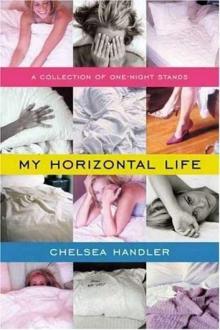 My Horizontal Life: A Collection of One-Night Stands
My Horizontal Life: A Collection of One-Night Stands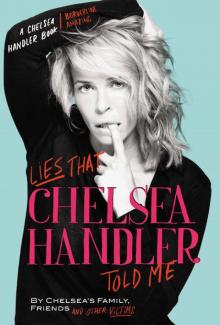 Lies That Chelsea Handler Told Me
Lies That Chelsea Handler Told Me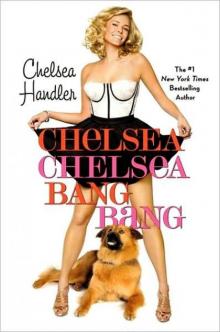 Chelsea Chelsea Bang Bang
Chelsea Chelsea Bang Bang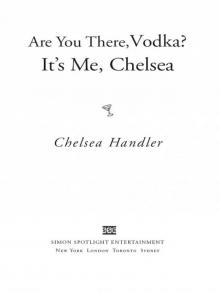 Are You There, Vodka? It's Me, Chelsea
Are You There, Vodka? It's Me, Chelsea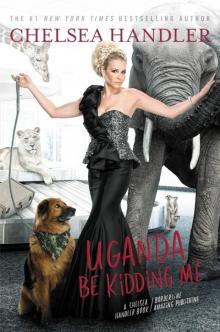 Uganda Be Kidding Me
Uganda Be Kidding Me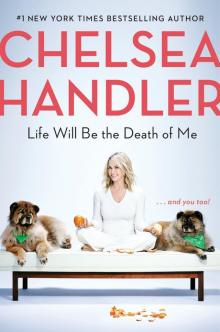 Life Will Be the Death of Me
Life Will Be the Death of Me